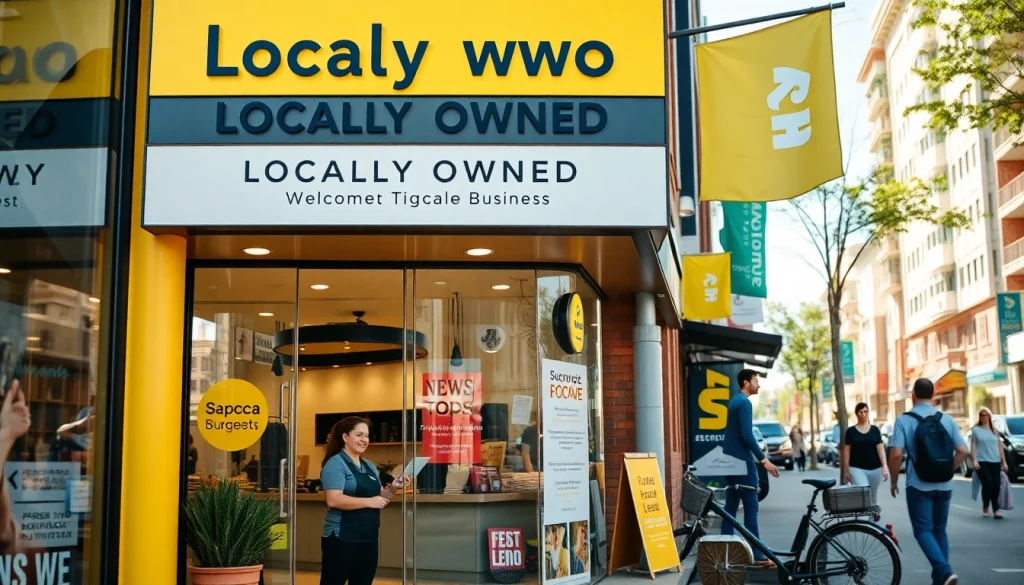Boost Your Community: The Benefits of Supporting Locally Owned Businesses

The Importance of Locally Owned Businesses
In recent years, there has been a growing emphasis on the importance of supporting locally owned businesses. These enterprises not only contribute to the local economy but also play a crucial role in fostering community relationships and promoting sustainable practices. This article delves into the multifaceted benefits of locally owned businesses while exploring the challenges they face and the strategies that can be employed to support their success.
Impact on Local Economy
Locally owned businesses are often considered the backbone of their communities. They provide unique goods and services that reflect the local culture, creating a personalized shopping experience that large corporations simply cannot replicate. One of the most significant impacts of supporting these businesses is the economic boost they provide. Studies have shown that when consumers spend their dollars at local shops, a greater portion of that money circulates within the community. According to a report from the American Independent Business Alliance, local businesses return three times more money per dollar of revenue to their local economies than their national counterparts.
Furthermore, locally owned businesses provide job opportunities, which are especially vital in areas where employment options are limited. As small businesses grow, they hire local talent, reduce unemployment rates, and contribute to a lower cost of living through competitive wages. By keeping money within the community, residents benefit from increased economic resilience and stability.
Building Community Relationships
Engagement and connection with the local community are pivotal aspects of the success of locally owned businesses. Owners and employees often develop personal relationships with their customers, creating a sense of belonging and community. This personalized approach fosters loyalty, as customers feel valued and appreciated. Furthermore, locally owned businesses are more likely to support local initiatives, charitable causes, and community events, which strengthens their ties with the public.
As a result, this interconnectedness leads to a more vibrant shopping experience, with small businesses often being at the forefront of innovation and creativity. Whether through hosting events, sponsoring local sports teams, or actively engaging in volunteer work, these businesses make meaningful contributions to the social fabric of their neighborhoods.
Encouraging Sustainability Practices
In an era focused on sustainability and environmental consciousness, locally owned businesses often lead the way in implementing eco-friendly practices. From sourcing local materials to reducing transportation emissions, these businesses tend to have a smaller carbon footprint compared to large corporations, which often rely on extensive supply chains.
Moreover, locally owned businesses are more likely to choose sustainable materials and support local producers, helping to cultivate a thriving local economy that prioritizes environmental stewardship. For example, a local cafe might source its coffee from a nearby farm, thereby reducing transportation emissions while also supporting local agriculture. This commitment to sustainability resonates deeply with customers who are increasingly concerned about the environmental impact of their purchasing decisions.
Challenges Facing Locally Owned Businesses
Competition with Large Corporations
Locally owned businesses face substantial challenges in competing with large corporations that benefit from economies of scale, aggressive marketing strategies, and extensive distribution networks. These larger entities often have more resources to invest in advertising, technology, and supply chains, which can make it difficult for small businesses to attract customers.
Local business owners must find innovative ways to differentiate themselves, emphasizing their unique offerings, exceptional customer service, and community connection. Developing a strong brand identity that resonates with local consumers can help to level the playing field. For instance, a boutique that highlights its locally made products and personalized shopping experiences is more likely to draw customers away from larger retailers.
Funding and Resource Limitations
Another significant challenge for locally owned businesses is accessing funding and resources. Unlike larger corporations, many small businesses operate with limited financial support and must contend with higher interest rates when seeking loans. This restriction can stifle growth and limit the ability to invest in marketing, technology, and infrastructure.
To mitigate these challenges, entrepreneurs can explore various options, such as local grants, crowdfunding campaigns, or community-supported financing initiatives. In addition, collaborative efforts with other small businesses can lead to mutual support and shared resources, enabling them to pool their funds for marketing or joint events.
Market Visibility Issues
Market visibility is crucial for any business, and locally owned enterprises often struggle to gain the attention they deserve. With numerous options available to consumers, small businesses must invest time and resources into marketing to break through the noise. Without a substantial online presence, they risk being overlooked in favor of more prominent names.
Building an online presence through social media platforms, local search optimization, and partnerships with local influencers can enhance visibility. Furthermore, setting up a dedicated website, utilizing local search engine optimization (SEO) strategies, and engaging in community outreach are essential steps that can help improve market visibility for locally owned businesses.
Strategies for Supporting Locally Owned Enterprises
Promoting Local Events and Initiatives
Communities can play a crucial role in supporting locally owned businesses by promoting local events and initiatives. Organizing farmer’s markets, craft fairs, and small business expos allows these enterprises to showcase their products and services while engaging directly with their customers.
Local governments and organizations can also host “shop local” campaigns that encourage residents to patronize businesses in their area. These efforts not only bring attention to local shops but also foster a sense of community pride and collectivity.
Leveraging Social Media Outreach
Social media has become an invaluable tool for marketing and customer engagement. Locally owned businesses should actively leverage social media platforms such as Facebook, Instagram, and Twitter to connect with their target audience. By sharing updates, promotions, stories, and customer testimonials, these enterprises can build a loyal following and generate buzz within the community.
Hosting online contests, providing incentives for sharing, or collaborating with local influencers can help amplify their reach. Educating local businesses on effective social media usage is an essential step in maximizing their marketing potential.
Developing Customer Loyalty Programs
Creating customer loyalty programs can greatly benefit locally owned businesses by encouraging repeat patronage. By offering rewards for frequent purchases, such as discounts or exclusive events, businesses can solidify long-term relationships with their customers.
These programs not only incentivize customers to return but also create a sense of belonging and community ownership. Engaging with customers for feedback on program offerings can enhance these initiatives, ensuring they resonate with local consumers.
Measuring the Impact of Supporting Locally Owned Businesses
Economic Growth Metrics
Measuring the impact of supporting locally owned businesses requires analyzing various economic growth metrics. These can include job creation rates, increases in local sales tax revenue, and the overall economic contribution to the community. By establishing a framework for tracking these metrics, community leaders can advocate more effectively for policies and initiatives that benefit local businesses.
Data collection through surveys and local chambers of commerce can help to quantify the economic impact and showcase the positive effects of supporting small enterprises. This information can inform regional development plans and promote more robust local economies.
Community Engagement Statistics
Community engagement is a vital component of supporting locally owned businesses. Metrics such as participation in local events, volunteer rates, and community donation totals can reveal a greater understanding of how citizens are interacting with these businesses.
Surveys and feedback tools can provide insights into how engaged residents feel with local brands, guiding businesses and community leaders on how to foster deeper connections.
Customer Retention Rates
Customer retention rates offer valuable insights into the success of locally owned businesses. By monitoring repeat purchases and customer feedback, businesses can gauge how well they are meeting the needs of their customers. Understanding satisfaction levels can help owners make necessary adjustments to improve their services and products.
Utilizing customer relationship management (CRM) tools can streamline this process, allowing businesses to track interactions and preferences. This data-driven approach enables locally owned businesses to nurture customer relationships and enhance retention strategies effectively.
Case Studies: Successful Locally Owned Business Models
Innovative Marketing Techniques
Several locally owned businesses have implemented innovative marketing techniques to stand out in competitive environments. For example, a local bookstore may host author signing events, book clubs, or themed evenings to draw in visitors while promoting local authors. These efforts not only increase foot traffic but also solidify the shop’s position as a community hub.
Additionally, businesses can create partnerships with local schools and institutions to foster brand loyalty and awareness among younger generations. This strategy not only promotes reading and education but also cultivates lasting relationships that benefit both the business and the community.
Collaborative Community Efforts
Collaboration can amplify the impact of locally owned businesses. Initiatives that bring various local entrepreneurs together can lead to joint marketing efforts, shared resources, and cross-promotion. For instance, several businesses can host a “Shop and Dine” day, where customers receive discounts when they visit multiple participating locations.
These collaborative efforts not only increase visibility but also create a cohesive sense of community. By uniting efforts, locally owned businesses can tackle challenges together and create a vibrant local economy.
Leveraging Local Resources for Growth
Local resources play a vital role in the growth of small businesses. By tapping into community networks, utilizing local suppliers, and engaging with nearby colleges for talent, locally owned businesses can keep their operations more sustainable and cost-effective. This approach not only supports the local economy but also solidifies a business’s commitment to its community.
Furthermore, by actively engaging with local organizations and government, small business owners can gain access to valuable insights, funding opportunities, and support programs designed specifically for their needs.






